Papers of Sir John Nimmo, 1945
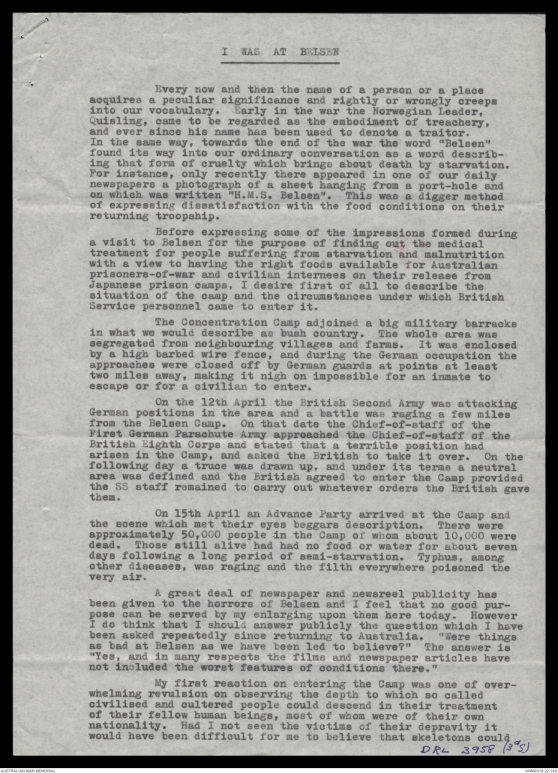
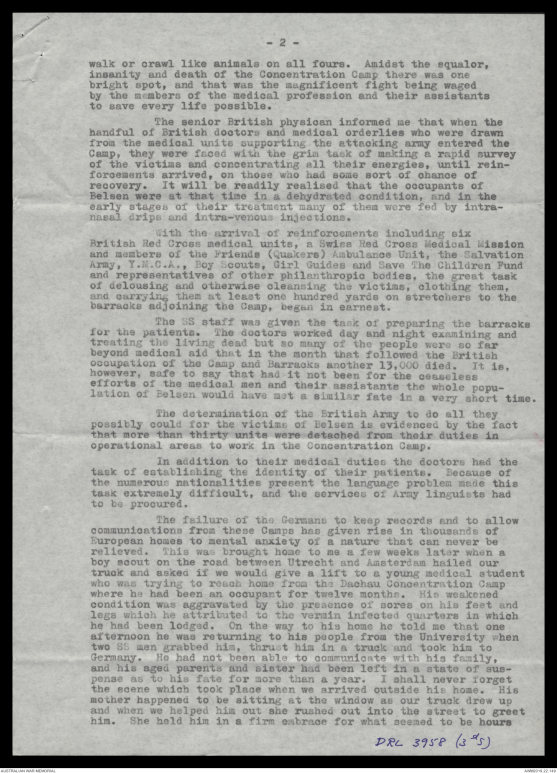
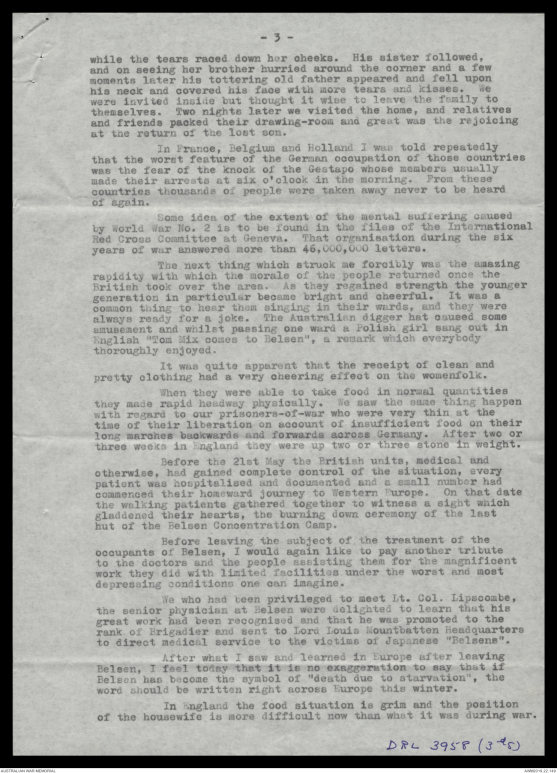
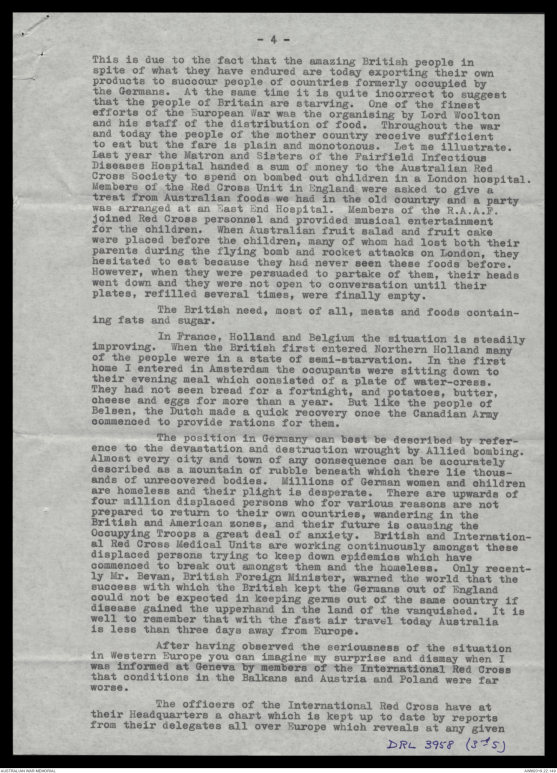
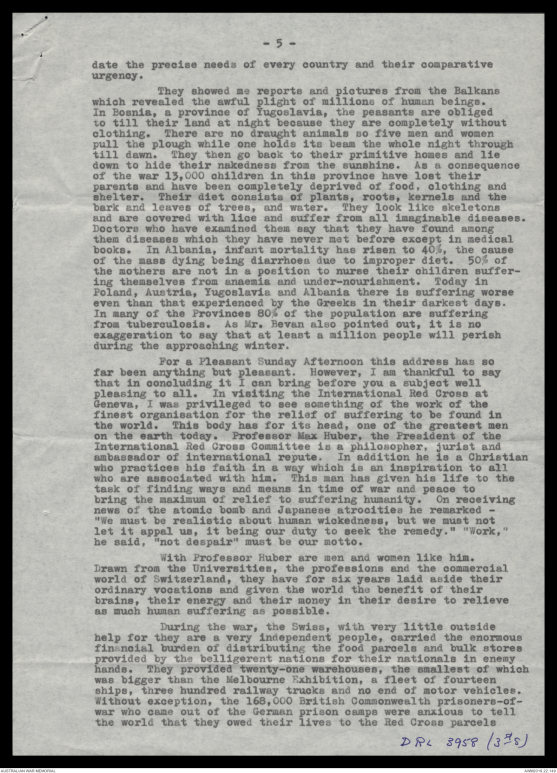
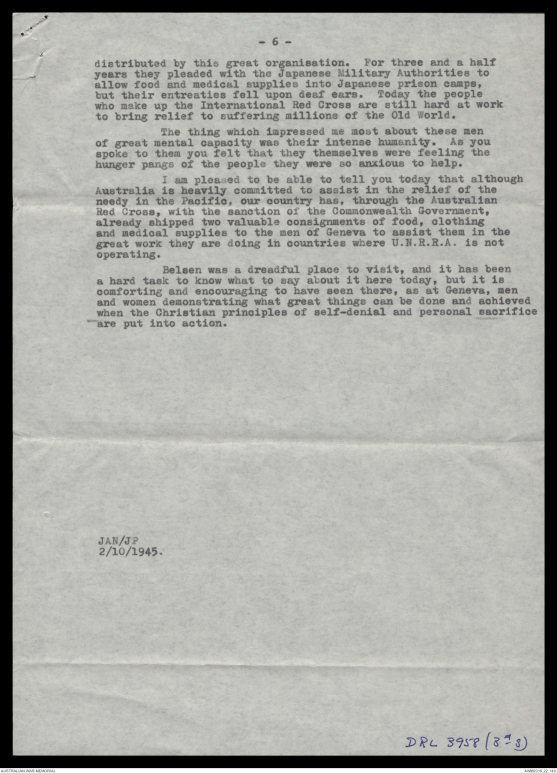
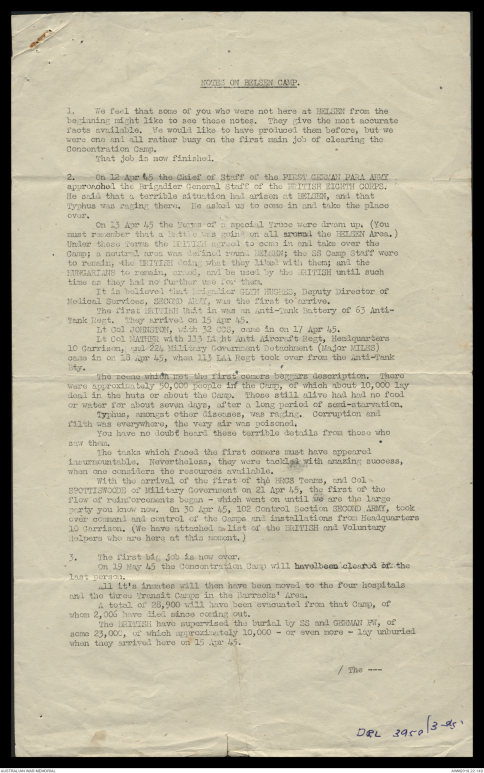
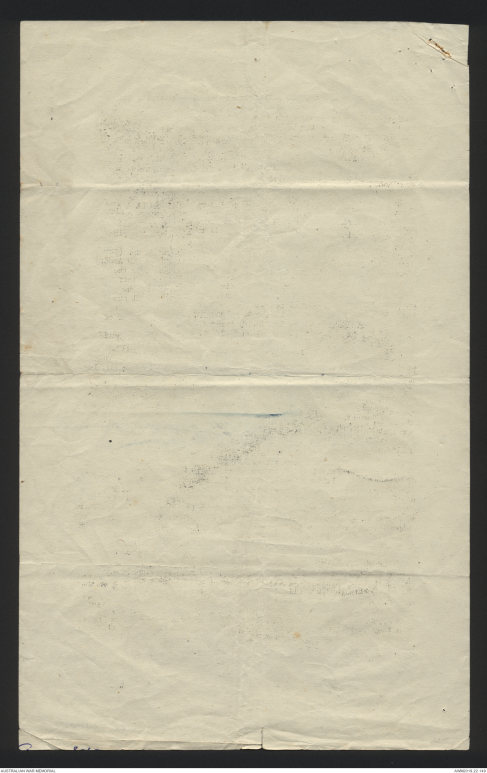
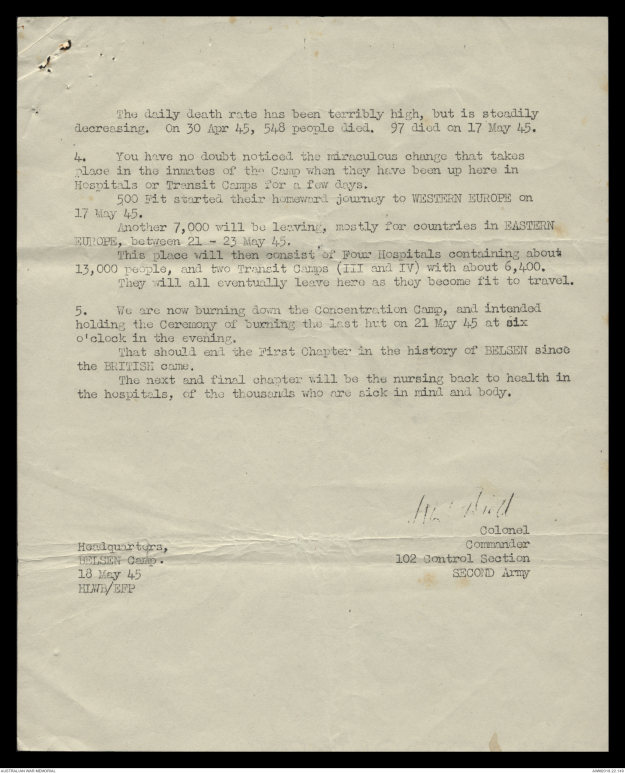
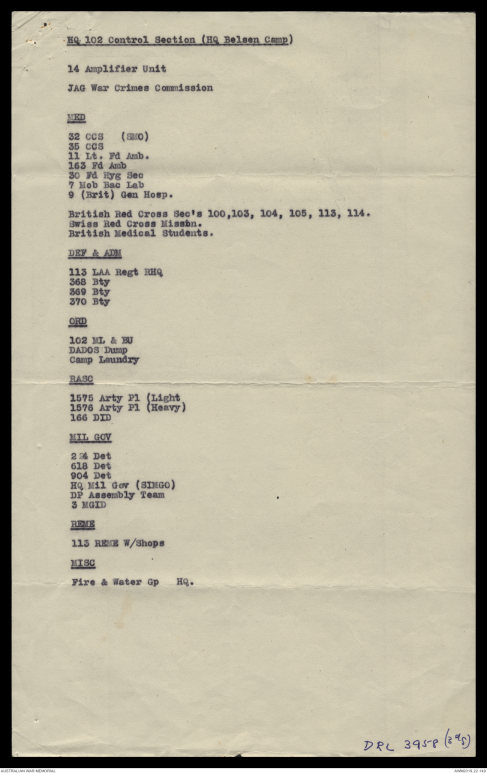
I WAS AT BELSEN
Every now and then the name of a person or a place
acquires a peculiar significance and rightly or wrongly creeps
into our vocabulary. Early in the war the Norwegian Leader,
Quisling, came to be regarded as the embodiment of treachery,
and ever since his name has been used to denote a traitor.
In the same way, towards the end of the war the word "Belsen"
found its way into our ordinary conversation as a word describ-
ing that form of cruelty which brings about death by starvation.
For instance, only recently there appeared in one of our daily
newspapers a photograph of a sheet hanging from a port-hole and
on which was written "H.M.S. Belsen". This was a digger method
of expressing dissastisfaction with the food conditions on their
returning troopship.
Before expressing some of the impressions formed during
a visit to Belsen for the purpose of finding out the medical
treatment for people suffering from starvation and malnutrition
with a view to having the right foods available for Australian
Japanese prison camps, I desire first of all to describe the
situation of the camp and the circumstances under which British
Service personnel came to enter it.
The Concentration Camp adjoined a big military barracks
in what we would describe as bush country. The whole area was
segregated from neighbouring villages and farms. It was enclosed
by a high barbed wire fence, and during the German occupation the
approaches were closed off by German guards at points at least
two miles away, making it nigh on impossible for an inmate to
escape or for a civilian to enter.
On the 12th April the British Second Army was attacking
German positions in the area and a battle was raging a few miles
from the Belsen Camp. On that date the Chief-of-staff of the
Frist German Parachute Army approached the Chief-of-staff of the
British Eighth Corps and stated that a terrible position had
arisen in the Camp, and asked the British to take it over. On the
following day a truce was drawn up, and under its terms a neutral
area was defined and the British agreed to enter the Camp provided
the SS staff remained to carry out whatever orders the British gave them.
On 15th April an Advance Party arrived at the Camp and
the scene which met their eyes beggars description. There were
approximately 50,000 people in the Camp of whom about 10,000 were dead. Those still alive had had no food or water for about seven
days following a long period of semi-starvation. Typhus, among
other diseases, was raging and the filth everywhere poisoned the
very air.
A great deal of newspaper and newsreel publicity has
been given to the horrors of Belsen and I feel that no good pur-
pose can be served by my enlarging upon them here today. However
I do think that I should answer publicly the question which I have
been asked repeatedly since returning to Australia. "Were things
as bad at Belsen as we have been led to believe?" The answer is
"Yes, and in many respects the films and newspaper articles have
not included the worst features of conditions there."
My first reaction on entering the Camp was one of over-
whelming revulsion on observing the depth to which so called
civilised and cultered people could descend in their treatment
of their fellow human beings, most of who were of their own
nationality. Hand I not seen the victims of their depravity it
would have been difficult for me to believe that skeletons could
DRL 3958 (3st5)
-2-
walk or crawl like animals on all fours. Amidst the squalor,
insanity and death of the Concentration Camp there was one
bright spot, and that was the magnificent fight being waged
by the members of the medical profession and their assistants
to save every life possible.
The senior British physican informed me that when the
handful of British doctors and medical orderlies who were drawn
from the medical units supporting the attacking army entered the
Camp, they were faced with the grim task of making a rapid survey
of the victims and concentrating all their energies, until rein-
forcements arrived, on those who had some sort of chance of
recovery. It will be readily realised that the occupants of
Belsen were at that time in a dehydrated condition and in the
early stages of their treatment many of them were fed by intra-
nasal drips and intra-venous injections.
With the arrival of reinforcements including six
British Red Cross medical units, a Swiss Red Cross Medical Mission
and members of the Friends (Quakers) Ambulance Unit, the Salvation
Army, Y.M.C.A, Boy Scouts, Girl Guides and Save The Children Fund
and representatives of other philanthropic bodies, the great task
of delousing and otherwise cleansing the victims, clothing them,
and carrying them at least one hundred yards on stretchers to the
barracks adjoining the Camp, began in earnest.
The SS staff was given the task of preparing the barracks
for the patients. The doctors worked day and night examining and
treating the living dead but so many of the people were so far
beyond medical aid that in the month that followed the British
occupation of the Camp and Barracks another 13,000 died. It is,
however, safe to say that had it not been for the ceaseless
efforts of the medical men and their assistants the whole pop-
ulation of Belsen would have met a similar fate in a very short time.
The determination of the British Army to do all they
possibly could for the victims of Belsen is evidenced by the fact
that more than thirty units were detached from their duties in
operational areas to work in the Concentration Camp.
In addition to their medical duties the doctors had the
task of establishing the identity of their patients. Because of
the numerous nationalities present the language problem made this
task extremely difficult, and the services of the Army linguists had
to be procured.
The failure of the Germans to keep records and to allow
communications from these Camps has given rise in thousands of
European homes to mental anxiety of a nature that can never be
relieved. This was brought home to me a few weeks later when a
boy scout on the road between Utrecht and Amsterdam hailed our
truck and asked if we would give a lift to a young medical student
who was trying to reach home from the Dachau Concentration Camp
where he had been an occupant for twelve months. His weakened
condition was aggravated by the presence of sores on his feet and
legs which he attributed to the vermin infested quarters in which
he had been lodged. On the way to his home he told me that one
afternoon he was returning to his people from the University when
two SS men grabbed him thrust him in a truck and took him to
Germany. He had not been able to communicate with his family,
and his aged parents and sister had been left in a state of sus-
pense as to his fate for more that a year. I shall never forget
the scene which took place when we arrived outside his home. His
mother happened to be sitting at the window as our truck drew up
and when we helped him out she rushed out into the street to greet
him. She held him in a firm embrace for what seemed to be hours
DRL 3958 (3st5)
-3-
while the tears raced down her cheeks. His sister followed,
and on seeing her brother hurried around the corner and a few
moments later his tottering old father appeared and fell upon
his neck and covered his face with more tears and kisses. We
were invited inside but thought it wise to leave the family to
themselves. Two nights later we visited the home, and relatives
and friends packed their drawing-room and great was the rejoicing
at the return of the lost son.
In France, Belgium and Holland I was told repeatedly
that the worst feature of the German occupation of those countries
was the fear of the knock of the Gestapo whose members usually
made their arrests at six o'clock in the morning. From these
countries thousands of people were taken away never to be heard
of again.
Some idea of the extent of the mental suffering caused
by World War No. 2 is to be found in the files of the International
Red Cross Committee at Geneva. That organisation during the six
years of war answered more than 46,000,000 letters.
The next thing which struck me forcibly was the massing
rapidity with which the morale of the people returned once the
British took over the area. As they regained strength the younger
generation in particular became bright and cheerful. It was a
common thing to hear them singing in their wards, and they were
always ready for a joke. The Australian differ hat caused some
amusement and whilst passing one ward a Polish girl sang out in
English "Tom Mix comes to Belsen", a remark which everybody
thoroughly enjoyed.
It was quite apparent that the receipt of clean and
pretty clothing had a very cheering effect on the womenfolk.
When they were able to take food in normal quantities
they made rapid headway physically. We saw the same thing happen
with regard to our prisoners-of-war who were very thin at the
time of their liberation on account of insufficient food on their
long marches backwards and forwards across Germany. After two or
three weeks in England they were up two or three stone in weight.
Before the 21st May the British units, medical and
otherwise, had gained complete control of the situation, every
patient was hospitalised and documented and a small number had
commenced their homeward journey to Western Europe. On that date
the walking patients gathered together to witness a sight which
gladdened their hearts, the burning down ceremony of the last
hut of the Belsen Concentration Camp.
Before leaving the subject of the treatment of the
occupants of Belsen, I would again like to pay another tribute
to the doctors and the people assisting them for the magnificent
work they did with limited facilities under the worst and most
depressing conditions one can imagine.
We who had been privileged to meet Lt. Col. Lipscombe,
the senior physician at Belsen were delighted to learn that his
great work had been recognised and that he was promoted to the
rank of Brigadier and set to Lord Louis Mountbatten Headquarters
to direct medical service to the victims of Japanese "Belsens".
After what I saw and learned in Europe after leaving
Belsen, I feel today that it is o exaggeration to say that if
Belsen has become the symbol of "death due to starvation", the
word should be written right across Europe this winter.
In England the food situation is grim and the position
of the housewife is more difficult now than it was during war.
DRL 3958 (3st5)
-4-
This is due to the fact that the amazing British people in
spite of what they have endured are today exporting their own
products to succour people of countries formerly occupied by
the Germans. At the same time it is quite incorrect to suggest
that the people of Britain are starving. One of the finest
efforts of the European War was the organising by Lord Woolton
and his staff of the distributions of food. Throughout the war
and today the people of the mother country receive sufficient
to eat but the fare is plain and monotonous. Let me illustrate.
Last year the Matron and Sisters of the Fairfield Infectious
Diseases Hospital handed a sum of money to the Australian Red
Cross Society to spend on bombed out children in a London hospital.
Members of the Red Cross Unit in England were asked to give a
treat from Australian foods we had in the old country and a party
was arranged at an East End Hospital. Members of the R.A.A.F
joined Red Cross personnel and provided musical entertainment
for the children. When Australian fruit salad and fruit cake
were placed before the children, many of whom had lost both their
parents during the flying bomb and rocket attacks on London, the
hesitated to eat because they had never seen these foods before.
However, when they were persuaded to partake of them, their heads
went down and they were not open to conversation until their
plates, refilled several times, were finally empty.
The British need, most of all, meats and foods contain-
ing fats and sugar.
In France, Holland and Belgium the situation is steadily
improving. When the British first entered Norhern Holland many
of the people were in a state of semi-starvation. In the first
home I entered in Amsterdam the occupants were sitting down to
their evening meal which consisted of a plate of water-cress.
They had not seen bread for a fortnight, and potatoes, butter,
cheese and eggs for more than a year. But like the people of
Belsen, the Dutch made a quick recovery once the Canadian Army
commenced to provide rations for them.
The position in Germany can best be described by refer-
ence to the devastation and destruction wrought by Allied bombing.
Almost every city and town of any consequence can be accurately
described as a mountain of rubble beneath which there lie thous-
ands of unrecovered bodies. Millions of German women and children
are homeless and their plight is desperate. There are upwards of
four million displaced persons who for various reasons are not
prepared to return to their own countries, wandering in the
British and American zones, and their future is causing the
Occupying Troops a great deal of anxiety. British and Internation-
al Red Cross Medical Units are working continuously amongst these
displaced persons trying to keep down epidemics which have
commenced to break out amongst them and the homeless. Only recent-
ly Mr. Bevan, British Foreign Minister, warned the world that the
success with which the British kept the Germans out of England
could not be expected in keeping germs out of the same country if
disease gained the upperhand in the land of the vanquished. It is
well to remember that with the fast air travel today Australia
is less than three days away from Europe.
After having observed the seriousness of the situation
in Western Europe you can imagine my surprise and dismay when I
was informed at Geneva by members of the International Red Cross
that conditions in the Balkans and Austria and Poland were far
worse.
The officers of the International Red Cross have at
their Headquarters a chart which is kept up to date by reports
from their delegates all over Europe which reveals at any given
DRL 3958 (3st5)
-5-
date the precise needs of every country and their comparative
urgency.
They showed me reports and pictures from the Balkans
which revealed the awful plight of millions of human beings.
In Bosnia, a province of Yugoslavia, the peasants were obliges
to till their land at night because they are completely without
clothing. There are no draught animals so five men and women
pull the plough while one holds its beam the whole night through
till dawn. They then go back to their primitive homes and lie
down to hide their nakedness from the sunshine. As a consequence
of the war 13,000 children in this province have lost their
parents and have been completely deprived of food, clothing and
shelter. Their diet consists of plants, roots, kernels and the
bark and leaves of trees, and water. They look like skeletons
and are covered with lice and suffer from all imaginable diseases.
Doctors who have examined them say that the have found among
them diseases which they have never met before except in medical
books. In Albania, infant mortality has risen to 40%, the cause
of the mass dying being diarrhoea due to improper diet. 50% of
the mothers are not in a position to nurse their children suffer-
ing themselves from anaemia and under-nourishment. Today
in Poland, Austria, Yugoslavia and Albania there is suffering worse
even than that experienced by the Greeks in their darkest days.
In many of the Provinces 80% of the population are suffering
from tuberculosis. As Mr. Bevan also pointed out, it is no
exaggeration to say that at least a million people will perish
during the approaching winter.
For a Pleasant Sunday Afternoon this address has so
far been anything but pleasant. However, I am thankful to say
that in concluding it I can bring before you a subject well
pleasing to all. In visiting the International Red Cross at
Genevan, I was privileged to see something of the work of the
finest organisation for the relief of suffering to be found in
the world. This body has for its head, one of the greatest men
on the earth today. Professor Max Huber, the President of the
International Red Cross Committee is a philosopher, jurist and
ambassador of international repute. In additions he is a Christian
who practices his faith in a way which is an inspiration to all
who are associated with him. This man has given his life to the
task of finding ways and means in time of war and peace to
bring the maximum of relief to suffering humanity. On receiving
news of the atomic bomb and Japanese atrocities he remarked -
"We must be realistic about human wickedness, but we must not
let it appal us, it being our duty to seek the remedy." "Work,"
he said, "not despair" must be our motto.
With Professor Huber are men and women like him.
Drawn from the Universities, the professions and the commercial
world of Switzerland, they have for six years laid aside their
ordinary vocations and given the world the benefit of their
brains, their energy and their money in their desire to relieve
as much human suffering as possible.
During the war, the Swiss, with very little outside
help for they are a very independent people, carried the enormous
financial burden of distributing the food parcels and bulk stores
provided by the belligerent nations for their nationals in enemy
hands. They provided twenty-one warehouses, the smallest of which
was bigger than the Melbourne Exhibition, a fleet of fourteen
ships, three hundred railway trucks and no end of motor vehicles.
Without exception, the 168,000 British Commonwealth prisoners-of-
war who came out of the German prison camps were anxious to tell
the world that they owed their lives to the Red Cross parcels
DRL 3958 (3st5)
-6-
distributed by this great organisation. For three and a half
years they pleaded with the Japanese Military Authorities to
allow food and medical supplies into Japanese prison camps,
but their entreaties fell upon deaf ears. Today the people
who make up the International Red Cross are still hard at work
to bring relief to suffering millions of the Old World.
The thing which impressed me most about these men
of great mental capacity was their intense humanity. As you
spoke to them you felt that they themselves were felling the
hunger pangs of the people they were so anxious to help.
I am pleased to be able to tell you today that although
Australia is heavily committed to assist in the relief of the
needy in the Pacific, our country has, through the Australian
Red Cross, with the sanction of the Commonwealth Government,
already shipped two valuable consignments of food, clothing
and medical supplies to the men of Geneva to assist them in the
great work they are doing in countries where U.N.R.R.A. is not
operating.
Belsen was a dreadful place to visit, and it has been
a hard task to know what to say about it here today, but it is
comforting and encouraging to have seen there, as at Geneva, men
and women demonstrating what great things can be done and achieved
when the Christian principles of self-denial and personal sacrifice
are put into action.
JAN/JP
2/10/1945
DRL 3958 (3st5)
NOTES ON BELSEN CAMP
- We feel that some of you who were not here at BELSEN from the
beginning might like to see these notes. They give the most accurate
facts available. We would like to have produced them before, but we
were one and all rather busy on the first main job of clearing the
Concentration Camp.
That job is now finished.
2. On 12 Apr 45 the Chief of Staff of the FIRST GERMAN PARA ARMY
approached the Brigadier General Staff of the BRITISH EIGHTH CORPS.
He said that a terrible situation had arisen at BELSEN, and that
Typhus was raging there. He asked us to come in and take the place
over.
On 13 Apr 45 the Terms of a special Truce were drawn up. (you
must remember that a Battle was going on all around the HELEN Area.)
Under these Terms the BRITISH agreed to come in and take over the
Camp; a neutral area was defined around HELEN; the SS Camp Staff were
to remain, the BRITISH doing what they liked with them; and the
HUNGARIANS to remain, around, and be used by the BRITISH until such
time as they had no further use for them.
It is believed that Brigadier GLYN HUGHES, Deputy Director of
Medical Services, SECOND ARMY, was the first to arrive.
The first BRITISH unit in was an Anti-Tank Battery of 63 Anti-
Tank Regt. They arrived on 15 Apr 45.
Lt Col JOHNSTON, with 32 CCS, came in on 17 Apr 45.
Lt Col MATHER with 113 Light Anti Aircraft Regt, Headquarters
10 Garrison, and 224 Military Government Detachment (Major MILES)
came in on 18 Apr 45, when 112 LAA Regt took over from the Anti-Tank
Bty.
The scene which met the first comers beggars description. There
were approximately 50,000 people in the Camp, of which about 10,000 lay
dead in the huts or about the Camp. Those still alive had had no food
or water for about seven days, after a long period of semi-starvation.
Typhus, amongst other diseases, was raging. Corruption and
filth was everywhere, the very air was poisoned.
You have no doubt heard these terrible details from those who
saw them.
The tasks which faced the first comers must have appeared
insurmountable. Nevertheless , they were tackled with amazing success,
when one considers the resources available.
With the arrival of the first of the HRCS Teams, and Col
SPOTTISWOODS of Military Government on 21 Apr 45, the first of the
flow of reinforcements began - which went on until we are the large
party you know now. On 30 Apr 45, 102 Control Section SECOND ARMY,
over command and control of the Camps and installations from Headquarters
10 Garrison. (We have attached a list of the BRITISH and Voluntary
Helpers who are here at the moment.)
3. The first big job is now over.
On 19 May 45 the Concentration Camp will have been cleared of the
last person.
All it's inmates will then have been moved to the four hospitals
and the tree Transit Camps in the Barracks' Area.
A total of 28,900 will have been evacuated from that Camp, of
who 2,006 have died since coming out.
The BRITISH have supervised the burial by SS and GERMAN PW, of
acme 23,000, of which approximately 10,000 - or even more - lay unburied
when they arrived here on 15 Apr 45.
/ The ---
DRL 3958/3st 5)
BLANK PAGE
The daily death rate has been terribly high, but it is steadily
decreasing. On 30 Apr 45, 548 people died. 97 died on 17 May 45.
4. You have no doubt noticed the miraculous change that takes
place in the inmates of the Camp whey they have been up here in
Hospitals or Transit camps for a few days.
500 Fit started their homeward journey to WESTERN EUROPE ON
17 May 45.
Another 7,000 will be leaving mostly for countries in EASTERN
EUROPE, between 21-23 May 45.
This place will then consist of Four Hospitals containing about
13,000 people, and two Transit Camps (III and IV) with about 6,400.
They will all eventually leave here as they become fit to travel.
5. We are now burning down the Concentration Camp, and intended
holding the Ceremony of burning the last hut on 21 May 45 at six
o'clock in the evening.
That should end the First Chapter in the history of BELSEN since
the BRITISH came.
The next and final chapter will be nursing back to health in
the hospitals, of the thousands who are sick in mind and body.
Headquarters,
BELSEN Camp
18 May 45
HLWB/EFP
Colonel
Commander
102 Control Section
SECOND Army
HQ 102 Central Section (HQ Belsen Camp)
14 Amplifier Unit
JAG War Crimes Commission
MED
32 CCS (SMO)
35 CCS
11 Lt. Fd Amb.
163 Fd Amb
30 Fd Hyg Sec
7 Mob Bac Lab
9 (Brit) Gen Hosp.
British Red Cross Sec's 100, 103, 104, 105, 113, 114.
Swiss Red Cross Mission.
British Medical Students.
DEF & ADM
113 LAA Reft RHQ
368 Bty
369 Bty
370 Bty
ORD
103 ML & BU
DADOS Dump
Camp Laundry
RASC
1575 Arty P1 (Light
1576 Arty P1 (Heavy)
166 DID
MIL GOV
224 Det
618 Det
904 Det
HQ Mil Gov (SINGO)
DP Assembly Team
3 MGID
REME
113 REME W/Shops
MISC
Fire & Water Gp HQ.
DRL 3958 (3st 5)
 Sam scott
Sam scottThis transcription item is now locked to you for editing. To release the lock either Save your changes or Cancel.
This lock will be automatically released after 60 minutes of inactivity.